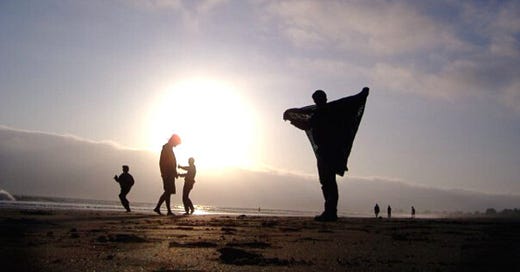I don’t agree with Buddha that life is suffering. But it is, most of the time, pretty “meh.” It’s routines, unsatisfying small-talk, and the occasional good meal. On any given day of the week, the best you can hope for is a really great night’s sleep.
But every so often, perhaps once every five years or so, life is the fucking best. It’s so good it’s beyond words. It’s RAHHHH!!! good. It’s beat your chest and raise a car over your head with one arm good.
These are peak experiences. Abraham Maslow, who coined the term, described peak experiences as “rare, exciting, oceanic, deeply moving, exhilarating, elevating experiences that generate an advanced form of perceiving reality, and are even mystic and magical in their effect.”
The fact that these experiences don’t happen more often is an absolute bummer. And by all appearances, younger generations are increasingly missing out on these experiences altogether. Given that Gen Z is taking fewer risks, having fewer social interactions, having less sex, drinking less, and doing fewer drugs, it’s probably true that some young people today have virtually never had a peak experience.
When cultural commentators talk about fixing societal ailments, they tend to talk about things like wages, food prices, rates of depression, fertility rates… The basic and the boring—the things that generally fall toward the bottom of Maslow’s hierarchy. This focus entirely ignores the reality that, compared to most of human history, we’ve already achieved foundational abundance. Sure, fine-tune the parameters of the economy. But really what we’re lacking are compelling reasons to sustain an unhinged lust for life.
Peak experiences don’t come out of nowhere. In modern times, they’re often predicated on the existence of some formal, sanctioned setting or activity. Ski slopes, for instance. High school basketball teams. Dance clubs. Ketamine clinics. Hiking trails. Climbing walls. Marathons. Churches. Punk shows.
Imagine a modern society that was optimized for peak experiences. What would that look like? A few obvious things come to mind: This society would make it easy for people to socialize. In place of car-dependent suburbs, there would be an abundance of walkable streets and third places. It would be easy for entrepreneurs to open new store-front businesses, especially if the business facilitated social activities. There would be incentives for joining and creating groups. There would be requirements for young people to join extracurricular activities, especially those that emphasized physical activity and competition.
I just read today that Northern California is planning to convert an old rail track to become a 307-mile hiking trail. “If realized, the project would be the longest so-called rail trail in the country, generally following the defunct track through towering redwoods and along rushing rivers teeming with salmon. The relatively flat trail would accommodate hikers, bikers and horseback riders.”
We need more of this!
Meanwhile: The suburbs are expanding. Youth participation in sports is declining. Time spent on social media is rising.
As individuals, we can all optimize our lives to make peak experiences more likely. Right now, sitting at your computer, you can sign up for a marathon, book a plane ticket to Bangkok, and message an old friend to ask if they want to get a drink and go to a rock concert.
But more than likely you’re not going to do this. I’m not either. And it’s a total bummer. Here’s hoping for a good night’s sleep!




